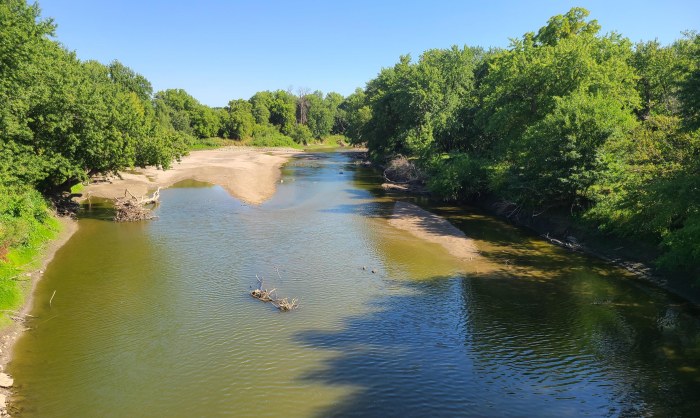This piece was co-authored by Emma Schmit, Iowa organizer for Food & Water Watch, and Danielle Wirth, a member of Iowa Citizens for Community Improvement and Food & Water Watch. -promoted by Laura Belin
Water is life. It’s undeniable. It’s also a fragile, finite resource that requires our protection. As catastrophic events, from drought to wildfires, ravage the United States, it’s clear that time is running out to mitigate the climate crisis and ensure everyone has access to safe, clean water.
While Iowa is known to most Americans for our cornfields, Ashton Kutcher, our cornfields, Hawkeye football, and our cornfields, what most don’t know is that we are enduring a water crisis.
Decades of industrialized, fencerow-to-fencerow agricultural practices have polluted over 1,000 miles of Iowa’s rivers and streams and more than 60,000 acres of our lakes, ponds, and wetlands. Each year, in addition to hundreds of thousands of pounds of chemical fertilizer, 72 billion pounds of manure from Iowa’s factory hog farms is injected or sprayed onto fields. This massive overapplication leads to the runoff of bacteria and chemicals, namely nitrogen and phosphorus, right into the water we drink.
Unfortunately, the state of Iowa has failed to take meaningful action to ensure our access to clean water. Despite voters from both sides of the aisle consistently listing water quality as one of their top concerns, our government has done nothing to address the issue. In 2018, the legislature doubled-down and passed legislation making the voluntary Iowa Nutrient Reduction Strategy the state’s official policy.
Just last month Des Moines Water Works, which serves half a million people, had to draw on reserves because of problems with their two water sources. The Raccoon River was too low and algae-clogged, while the Des Moines River was too polluted with algae toxins.
While there is no concern of running out of water at this point in time thanks to the preparedness of Des Moines Water Works, that may not always be the case. The dangerous combination of drought and agribusiness pollution threaten a perfect storm that could create a serious water shortage. This is an alarm bell we cannot afford to ignore. Particularly as climate catastrophe looms overhead, bringing with it increased drought, severe storms, unprecedented flooding, and other extreme weather events, it’s more important than ever that we address Iowa’s water crisis.
With 767 impaired waterways throughout the state, we don’t have the luxury of time. We must implement solutions to restore and protect our most valuable natural resource. The Iowa legislature has wasted years ignoring solutions or suggesting fixes that would only result in negligible change. Enough is enough. Our water cannot wait.
Food & Water Watch and Iowa Citizens for Community Improvement filed a lawsuit, along with help from Public Justice, against the state of Iowa last year in order to ensure our right to clean water. When our elected officials choose not to act, it’s up to us, the people of Iowa, to fight for change. With sections of the Raccoon River too polluted to swim, paddle or fish due to excessive pollution from industrial agricultural practices, it’s clear the state has abdicated its responsibility to protect our water for the use and enjoyment of all Iowans. Our water has been sacrificed for the profits of multi-billion dollar agribusinesses. We need bold, uncompromising solutions now.
The first step in improving the dependability of our water supply is to stop polluting. We need a mandatory nutrient reduction strategy. The current voluntary measures clearly do not go far enough to protect Iowa’s water. We also must implement a moratorium on factory farms, which are a leading polluter of both our water and air. If we hope to have access to clean drinking water in the years down the line, we must quit accepting half-measures as “solutions” to our water quality crisis.
We cannot continue to risk our water so corporate ag can stuff their pocketbooks. It doesn’t have to be this way. Iowans have a right to clean water. It’s time our interests are placed before the desires of the corporate agriculture industry and a handful of wealthy CEOs. The industry has exerted its outsized influence over the state of Iowa for far too long. We must draw a line and demand solutions that work for farmers, consumers, and communities, not just the fat cats of the factory farm industry. Our water, and our lives, depend on it.
Top image: Photo by Emma Schmit of the Raccoon River, published with permission.


1 Comment
Thank you for a good essay!
And while we’re at it, let’s rewrite Iowa’s horrible drainage laws. The Iowa Environmental Council just released a good analysis of Iowa drainage laws, and that analysis is well worth a skim for anyone interested in how Big Ag retains an iron (and polluting) grip on Iowa long after many other states and Canada have moved forward on water quality.
PrairieFan Tue 29 Sep 2:01 PM